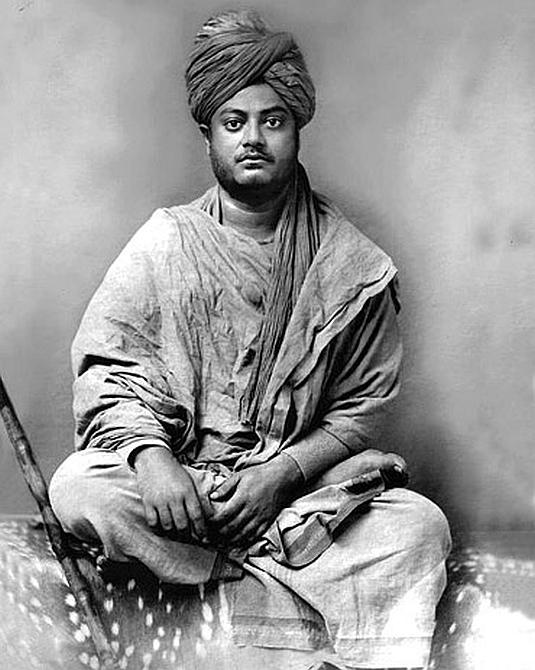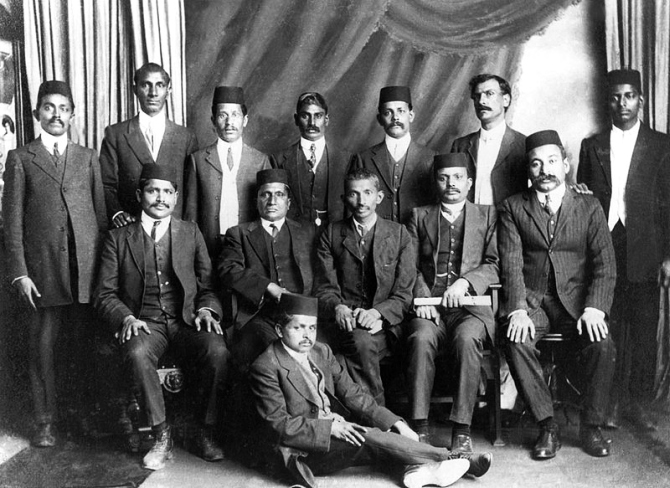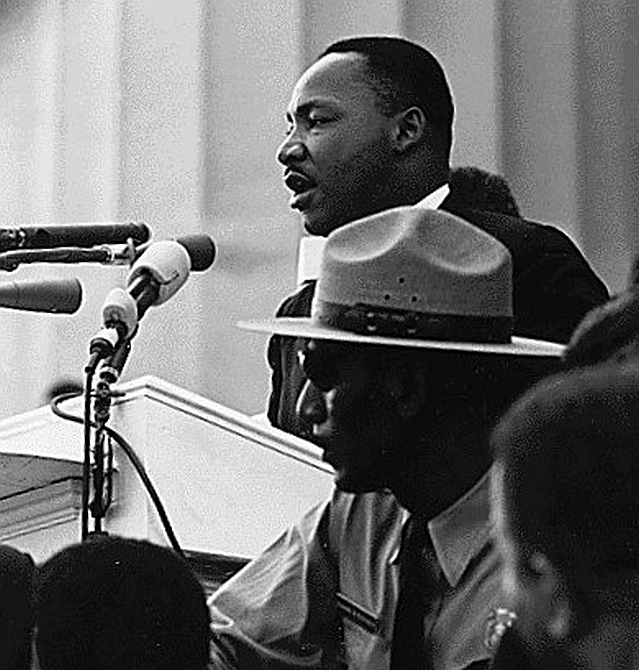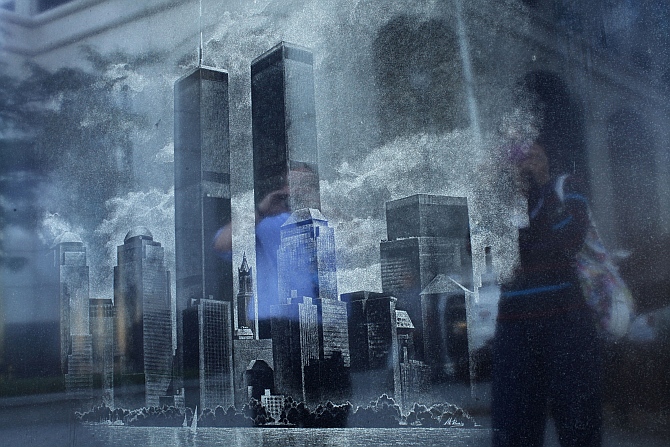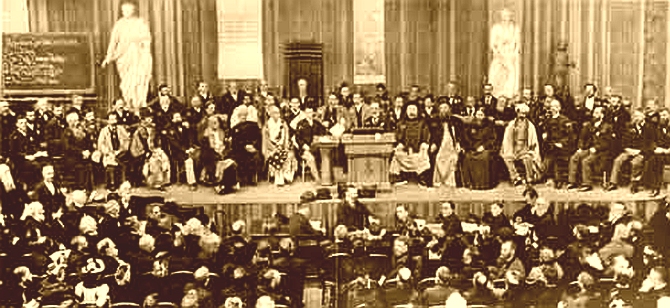 | « Back to article | Print this article |
Remembering the THREE 9/11s
The world remembers Osama bin Laden’s 9/11. But it ought to pay heed to the previous two 9/11s, associated with the messages of Swami Vivekananda and Mahatma Gandhi, say Sudheendra Kulkarni and Radha Viswanathan
Some world-shaking events in history are simply known by succinct code words. Thus, innocent-sounding words like ‘Little Boy’ and ‘Fat Man’ immediately conjure up in our minds images of the fiery mushroom clouds that darkened the skies of Hiroshima and Nagasaki, as two atomic bombs by bearing these names rained death and devastation on these Japanese cities on August 6 and 9, 1945.
Similarly, Apollo 11 is not merely the name of an aircraft. It recreates a proud moment in human history when man reached the moon.
To this day, and long after Archimedes passed away, his ‘Eureka moment’ stands for the thrill of discovery and innovation, which waters the evergreen tree of science.
What does 9/11 stand for? The answer that most people in the world, including in India, would give is obvious. “It stands for the horrific terror attacks on New York and other places in the United States, which took place on that unforgettable Tuesday in September 2001.”
The answer is obvious because the event is recent, its shock experience still fresh in people’s memory. And the memory has become indelible because of the television images of the two hijacked planes smashing into the World Trade Centre in New York City and reducing its two iconic towers to a heap of smouldering rubble.
Those who give this answer, and no other, are clearly unaware that 9/11 also stands for two other epoch-making events, whose message is the very antithesis of the Al Qaeda terror attacks in the US that killed nearly 3,000 innocent persons.
First 9/11: Swami Vivekananda in Chicago
The first 9/11 marks the first-ever Parliament of World Religions, which opened on September 11, 1893, in Chicago, and gave a clarion call for global peace and concord, based on the principle of universal brotherhood enshrined in all faiths. And no participant in the Chicago assembly delivered this message more forcefully, and more enduringly, than Swami Vivekananda, representing Sanatana Dharma, more commonly known as Hinduism, from India. Although he spoke on nearly 10 different occasions during the 17-day-long conference, he set the tone for it with his stirring speech on the inaugural day itself.
In the concluding lines of Swami Vivekananda’s 9/11 speech lies the clearest and the most prescient call for the rejection of the ideology of extremism which inspired the 9/11 terror attacks in 2001.
'Sectarianism, bigotry, and its horrible descendant, fanaticism, have long possessed this beautiful earth. They have filled the earth with violence, drenched it often and often with human blood, destroyed civilisation and sent whole nations to despair. Had it not been for these horrible demons, human society would be far more advanced than it is now.
'But their time is come; and I fervently hope that the bell that tolled this morning in honour of this convention may be the death-knell of all fanaticism, of all persecutions with the sword or with the pen, and of all uncharitable feelings between persons wending their way to the same goal.'
Click NEXT to read further...
Gandhiji presented satyagraha as 'love in action'
What he said in his address on the inaugural day of the Parliament of Religions, he further reinforced through his address on its concluding day (September 27, 1893). Let us listen to the concluding lines of that speech:
'If the Parliament of Religions has shown anything to the world, it is this: It has proved to the world that holiness, purity and charity are not the exclusive possessions of any church in the world, and that every system has produced men and women of the most exalted character. In the face of this evidence, if anybody dreams of the exclusive survival of his own religion and the destruction of the others, I pity him from the bottom of my heart, and point out to him that upon the banner of every religion will soon be written in spite of resistance: ‘Help and not Fight,’ ‘Assimilation and not Destruction,’ ‘Harmony and Peace and not Dissension’.”
Pay attention to each of the three appeals made by Swami Vivekananda. Notice the contrast between the last words and the first words in each appeal: ‘Fight’, ‘Destruction’ and ‘Dissension’ must be brought to an end, Swamiji exhorts. But how? By faithfully accepting, and adhering to, the ideals of ‘Help’, ‘Assimilation’ and ‘Harmony and Peace’. Can the contrast between the third 9/11, of 2001, which accepted only the first set of hate-filled words, and the original 9/11 of 1893, which glorified and sanctified only the last set of words, be more forcefully presented than this?
Taken together, Swami Vivekananda’s message from his addresses in Chicago, and from his subsequent discourses in America, Europe and India, shows our conflict-ridden world the path towards a new epoch of conflict-resolution and concord-creation.
Second 9/11: Mahatma Gandhi in South Africa
Let us now turn to another epoch-making 9/11, which too aims to achieve the same ends as were visualised by Swami Vivekananda’s 9/11. We are referring here to Mahatma Gandhi’s adoption of satyagraha (Truth Force or Soul Force) in South Africa on September 11, 1906, as the only justifiable method of achieving humane and just objectives.
In subsequent years and decades, Gandhiji assiduously developed the ‘moral weapon’ of satyagraha in his leadership of India’s struggle for freedom from British rule. In doing so, he succeeded in setting a unique and extremely valuable example before the whole world.
He demonstrated that, if the ends are right, nations and communities can employ the right means -- that is, non-violent and moral means -- to achieve them. He thus contested the entrenched belief held by many political movements, the communist movement being the foremost among them, that it is alright to use the wrong means if the end is right.
Gandhiji presented satyagraha (which literally means ‘clinging to truth’) as “love in action” or, in other words, love on a mass scale. Love is harmony, and harmony cannot exist where Truth doesn’t exist.
Therefore, if individuals, organisations and nations consistently follow the path of truth, believing genuinely that truth alone triumphs (Satyameva Jayate, an Upanishadic line which is the motto of the Indian Republic), then the world will begin to see new constructive possibilities in international and social relations.
Click NEXT to read further...
'The choice is no longer between violence and non-violence'
Gandhiji put his satyagraha message in stark terms: 'If mankind is to live, it has to come growingly under the sway of truth and non-violence.' Therefore, his discovery, and subsequent affirmation throughout his life, of the immutable, God-imposed link between means and ends is what makes the second 9/11 historically significant.
Mahatma’s 9/11 message evoked support from many great Americans. 'It has become appallingly obvious that our technology has exceeded our humanity,' wrote Albert Einstein. Martin Luther King Jr, who is regarded as the ‘American Gandhi’ said: “Our scientific power has outrun our spiritual power; we have guided missiles and misguided men...; if we are to go forward, we must go back and rediscover those precious values: that all reality hinges on moral foundations and that all reality has spiritual control... The moral arc of the universe bends at the elbow of justice.'
He also warned: 'The choice is no longer between violence and non-violence. It is either non-violence or non-existence.'
Vedantic kinship between Vivekananda, Gandhi and Martin Luther King Jr
Incidentally, in December 2012, Martin Luther King’s son, Reverend Martin Luther King III, was the keynote speaker who inaugurated the World Congress of Religions in Washington, DC, which was organised to commemorate the 150th birth anniversary of Swami Vivekananda.
The subject of his address was ‘Vedanta and Interfaith Teachings’. He said, “Swami Vivekananda, like my father, Martin Luther King Jr, did not live to see his 40th birthday. And it is interesting that both men were born in mid-January and that their earthly lives ended at the age of 39. But in their relatively short lives, they were able to inspire millions to embrace the higher values of peace and brotherhood.”
Interestingly, Martin Luther King III sketched a spiritual connection between his father, Mahatma Gandhi and Swami Vivekananda. “Both of these men (my father and Swamiji) were in a sense connected by the ancient wisdom of Vedanta -- my father through the profound influence of Mahatma Gandhi, who was, in turn, an ardent student of the teachings of Vivekananda.”
He pointed out that his father was a Baptist minister, “but, like Gandhi and Vivekananda, he felt that all faiths had great wisdom to teach humanity…And what a world it would be, if the great teachers of all faiths would echo the teachings of Vivekananda…”
“Like Vivekananda, we must strive for a world in which no one religion has dominance over any other. A reverence for non-violence is both implicit and explicit in the teachings of Vivekananda, Gandhi and Martin Luther King Jr.”
Making an indirect reference to 9/11 of 2001 and other such terrorist acts -- and also to wars between nations that often feed terrorism -- he commented: “It is unfortunate that so much war and terrorist violence occurs between people of faith, who practise different religions. Sometimes what is called religious conflict emerges because extremist groups have corrupted their faith by replacing tolerance with violence. Young people of all races, religions and nations are too often easily seduced by advocates of violence.”
He further said, “My father had a dream, not just for the United States, but for making the entire world a better place”, and recalled how his father talked about creating “a beloved community… In fact, he learned of this idea of the beloved community from the philosopher Josiah Royce, who was also a student of Vivekananda.”
Click NEXT to read further...
Third 9/11: How it proves Vivekananda and Gandhi right
The horrific images associated with the third version of 9/11 have, as mentioned earlier, become an emblem for international terrorism. Although the attacks on that day were executed in the name of Islam, they were the very antithesis of the message of peace, which is at the heart of the faith propounded by Prophet Mohammed.
The contrast between the Cave of Hira in Saudi Arabia, where the Prophet received the first verses of Holy Qur’an, and the cave in Afghanistan where Osama bin Laden and his colleagues plotted the attacks on America, with aeroplanes used as missiles, is as stark as between day and night.
How Islam continues to be misinterpreted and misused for a murderous and bigoted political agenda is one disquieting side of the current global politics. Its other equally disturbing side is how, in the name of ‘War on Terror’, the land of Martin Luther King Jr -- whom Time magazine described as a ‘founding father’ of America in a recent issue commemorating the 50th anniversary of his historic ‘I Have A Dream’ speech -- has been employing its hi-tech military might to shed the blood of innocent human beings in distant lands.
Therefore, on the 12th anniversary of Osama bin Laden’s 9/11, the world would do well to recall the previous two 9/11s associated with the names of Vivekananda and Gandhi.
On the occasion of the centenary of Satyagraha on 9/11, 2006, Michael Nagler, an American scholar who is a devoted Gandhian and peace activist, wrote a booklet titled Hope or Terror -- Gandhi and the Other 9/11. It begins with these lines:
'Nine-eleven 2001 came as a deep shock to those who have dedicated their lives to peace. Whether or not we lost a loved one in that explosion of hatred (as I did), violence challenges our faith and adds an extra dimension of grief for those who feel most poignantly the futility of violence. 1,500 years ago, in response to a similar crisis, St Augustine declared his faith that the search for peace is embedded in human nature.
'Whether we’re aware of it or not, he said, our deepest desire is “to seek fellowship and as far as we possibly can, peace with every man” and woman and all that lives. But those of us who work for peace are perhaps more aware of this desire and feel violations of it all the more deeply, for we not only long for but believe in peace -- believe that it is possible even in our time.
'And we have reason to. By a strange coincidence it was exactly a century ago, on September 11, 1906, that Mahatma Gandhi launched a new way of waging conflict that many believe can lead humanity from the mire of hatred in which we seem to be bogged down out into the clear land of peace.
Click NEXT to read further...
'We ignore Vivekananda's message at our peril'
These two 9/11s, the one freshly smarting and the other much less appreciated or understood (or in most cases, even remembered), seem like signposts for two paths that can be taken by the human race. Our added grief, therefore, does not open into the pit of despair.'
Describing the third 9/11 as a “wake-up call for humanity”, Nagler asserts that Gandhi’s satyagraha philosophy shows us the way to a non-violent, just and democratic reconciliation of differences in the world.
'Satyagraha, whose seemingly endless applications we have only begun to explore, would seem to hold out a great hope for the future of humanity. We human beings will never cease to have differences -- fortunately, because our differences are part of what makes us human. We will never cease to have different opinions, and probably never cease to perceive that our own interests are at odds with those of others. But there is no reason that these differences must deepen into enmities that finally cause explosions of anger as they did that terrible morning five years ago. If we stay on that path, our future is indeed bleak. If we even live to see one.
'This is why it is so important that we realise that humanity has a double legacy, which is strangely symbolised in two 9/11s. The century that gave us both Gandhi and Adolf Hilter gave us a crucial choice, if we become aware of the power that was launched on September 11, 1906.
'Whatever we remember -- the stories we choose to tell ourselves about our past -- will have a determining influence on who we become. If we do not remember the ‘other’ 9/11 we will be doomed to relive the violence of 2001. But if we do remember it we can put the more recent tragedy in context. In that context the tragedy becomes greater, but in a strange way more endurable, for seeing the alternative to violence shows both the urgency and the possibility of laying it finally to rest. If we remember this, then ‘9/11’ can become for the whole world what it has been for peace scholars and activists, not just a nightmare but a wake-up call.'
Even though Nagler does not mention the 9/11 of 1893, Nagler is indirectly endorsing Swami Vivekananda’s Chicago message.
As a matter of fact, Nagler, author of The Search for a Nonviolent Future, is also deeply influenced by Swami Vivekananda’s philosophy. He says: “Swami Vivekananda was a spiritual pioneer, the first major figure to bring the priceless wisdom of ancient India to the modern world. In this age of materialism, we ignore his message at our peril.”
Excerpted from A monk from Bombay: Swami Vivekananda’s Historic Voyage from Mumbai to Chicago by Sudheendra Kulkarni and Radha Viswanathan. Published by the Observer Research Foundation Mumbai to mark the 150th birth anniversary of Swami Vivekananda. Comments are welcome at sudheenkulkarni@gmail.com or radha.v@orfonline.org
TOP photo features you missed last week
Click on MORE to see another PHOTO features...
